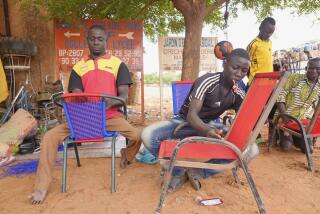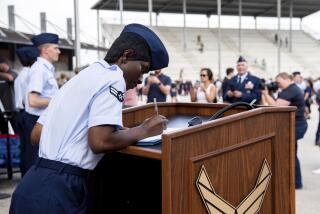A Wartime Role for Exiles May Be Two-Edged Sword
- Share via
PARIS — PARIS -- Leaders of the Iraqi opposition hope exile volunteers preparing to attend a U.S. training program in Hungary will serve as valuable intermediaries for American troops during any invasion of their homeland and help build a new military if President Saddam Hussein falls.
But the plan has provoked predictable discord in the fractious exile community and among Iraq-watchers, with some warning that the force could be viewed by ordinary Iraqis as a U.S. puppet.
Iraqi volunteers in the United States are reporting to a secret location for the final stages of screening by Defense Department personnel, who will then transport successful applicants to Taszar Air Base, a North Atlantic Treaty Organization facility in Hungary, according to U.S. officials. Volunteers are also expected to gather soon in Europe and the Middle East, according to opposition groups.
The three-month training will prepare the volunteers to act as interpreters and guides and for other auxiliary roles aiding U.S. troops. The Iraqis have been chosen from a list provided by opposition groups, primarily the London-based Iraqi National Congress, or INC. Opposition leaders envision a force of as many as 10,000 men, although the training program in Hungary has been approved for just 3,000.
U.S. trainers will instruct the exiles in self-defense and the use of small arms but not full-fledged combat techniques, according to U.S. military officials.
The exiles would have two primary missions in a military campaign, according to opposition groups. They would play a delicate liaison role with Iraqi military units, which the opposition -- and U.S. strategists -- expects to surrender or turn against the regime in considerable numbers during an invasion.
And, in a post-conflict scenario, the exiles would help police their homeland, take part in civilian-military reconstruction efforts and build a new Iraqi military, the opposition hopes.
“It’s reasonable to assume it could be the nucleus of some part of a new Iraqi army,” said Francis Brooke, an advisor to the Iraqi National Congress. “The Iraqi army will have to be restructured from top to bottom.”
Although the exile force is a long-sought goal of the U.S. Congress and the Pentagon, an Iranian-backed Shiite Muslim group that controls thousands of guerrillas in southern Iraq has steered clear of the initiative.
“We think this will compromise the credibility of the opposition,” Hamid Bayati, the London representative of the Supreme Council for the Islamic Revolution in Iraq, said in an interview Thursday. “This will undermine the opposition because we will be seen as being part of the invasion, of being with the Americans. In general, we are already suffering in Iraq from a media campaign representing us as puppets of the Americans.”
Moreover, some military analysts say the proud Iraqi armed forces wouldn’t take kindly to being reformed by U.S.-led exiles, even after a crushing defeat.
“It’s true the Americans need translators and scouts -- this is a legitimate role,” said Mustafa Alani, an Iraqi-born analyst at the Royal United Services Institute, a British government-affiliated think tank in London. “But Iraq has one of the oldest armies in the Arab world. It is still functioning. It’s not serious to think the exiles would become the core of a new army.”
The exiles are likely to be pressed into service to help keep the peace after an invasion. That is no small task, and it will require cultural sensitivity. There are fears that the collapse of Hussein’s brutal dictatorship, coupled with the country’s historic ethnic, tribal and religious grudges, could set off wholesale violence and score-settling.
“We are told they are going to act essentially as a police force,” said Charles Heyman, editor of Jane’s World Armies.
If the force sees action, it will introduce a new element into the potentially volatile mix of opposition fighters on the ground in Iraq.
Already, the Iranian-based group’s Badr Brigade carries out guerrilla actions in southern Iraq, a Shiite stronghold, and increasingly in Kurdish-controlled northern Iraq as well. The Badr Brigade is trained and to some extent controlled by the Iranian military, a potential source of friction with the United States. The Shiite group can deploy 15,000 to 20,000 fighters, according to Bayati.
The dominant armed force opposing Hussein in the north, however, is the Kurds’ hardy peshmerga, the fighters whose name means “those who face death.” They number 50,000 troops, and an additional 50,000 part-time volunteers.
The new exile force will be far smaller and less experienced. But its advocates say its members will be useful auxiliary forces for U.S. troops dealing with Iraqi civilians and troops alike during the possibly chaotic conditions of an invasion, according to INC officials.
Scouts could identify hostile members of the security forces who try to blend into the population, assist with prisoners and mediate with troops who want to change sides, organizers said.
“They can act as a catalyst for defecting Iraqi units,” a senior INC official said in a recent interview. “It will be easier for them to surrender to fellow Iraqis. And the U.S. military will only trust foreign forces that they have trained themselves.”
Critics who paint the force as a group of outsiders don’t understand the makeup of the exiles being assembled by the Defense Department, the opposition insists. The applicants have been selected for their knowledge of potential hot spots, such as southern and western Iraq, where an invasion would be likely to begin, according to INC officials.
Many of them come from those regions and are refugees in Iran, Jordan, Britain, Scandinavia and Eastern Europe.
Many in the U.S. live in the large Arab communities around Detroit, although applicants will be coming from around North America, according to organizers.
“The applicants are being asked to report for training,” Brooke said. “They are mustering at bases in the U.S. right now.”
As in any training program, not everyone will make the final cut. Some won’t even make it to Hungary. Although the volunteers are reporting for duty, U.S. officials are still investigating their backgrounds to weed out extremists, Iraqi spies, criminals or human rights violators.
“That screening is to allow us to ensure that only the right types of people enter into this program,” Maj. Gen. David W. Barno, the director of the training program, told journalists at the Taszar base Thursday.
More to Read
Sign up for Essential California
The most important California stories and recommendations in your inbox every morning.
You may occasionally receive promotional content from the Los Angeles Times.













